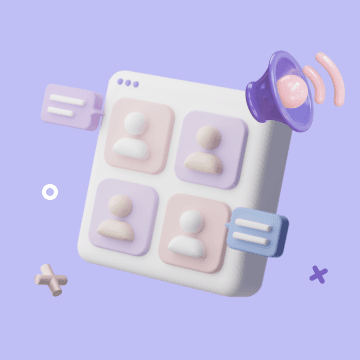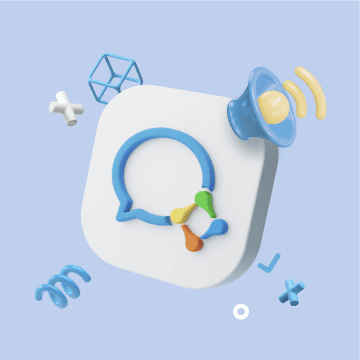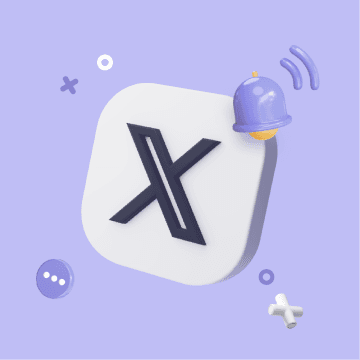
Airtable Alternative for QA Engineer: AI Project Issues and Tickets
QA Engineers' Quest for Automation Tools
In the fast-paced world of software development, QA Engineers face a multitude of challenges. One of the key areas is effectively managing project issues, tickets, requirements, and bugs. Automation tools have emerged as a potential savior, but finding the right one can be a daunting task. Airtable is often a go-to option, but is it truly the best fit? Enter Bika.ai's AI Project Issues and Tickets template, which offers a compelling alternative.
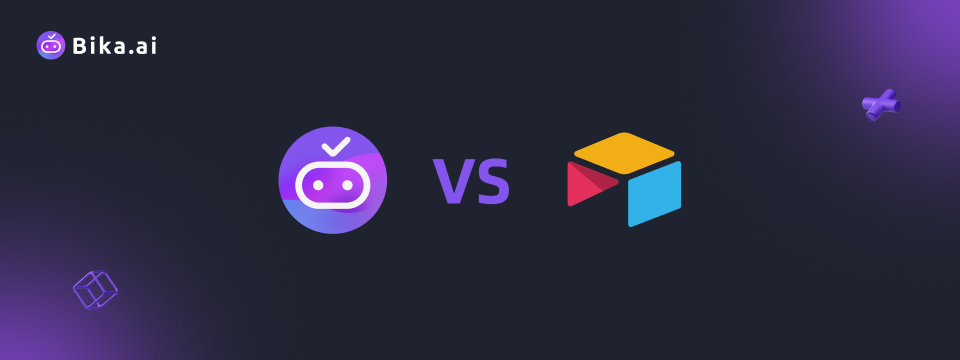
Airtable vs Bika.ai: Key Features At a Glance
Let's take a closer look at how Airtable and Bika.ai stack up against each other in terms of key features.
| Feature | Airtable | Bika.ai |
|---|---|---|
| Pricing | Free provided, paid plans from $20/user/month | Free provided, paid plans from $9.99/user/month |
| Platform Type | No-code database | No-code AI automation database |
| Ease of Use | Base structure is geeky for non-tech users | Directory tree is easy to use and user-friendly for general users |
| Records per Database | Up to 125,000 records per base for Business plan | Up to 1,500,000 records per database for Team plan |
| Automation | Basic automation capabilities with limited triggers and actions | Advanced automation capabilities with extensive triggers and actions |
| Template | Templates don’t include automation capability; no automation publish and share | plenty of plug-and-play AI automated templates with preset content; supports automation publish and share |
| Storage | 100 GB of attachments per base | 800 GB per space |
| API | Limited APIs | API-first platform making every feature an integration endpoint for automation |
Bika.ai: Tailored for QA Engineers
Bika.ai's team has conducted in-depth research into the QA Engineer community and crafted the AI Project Issues and Tickets template based on industry insights and a profound understanding of user needs, while also incorporating market best practices.

The Value of Bika.ai for QA Engineers
The Bika.ai template offers significant value to QA Engineers. It helps increase efficiency by automating the collection and summarization of issues and tickets. This saves precious time, reduces the likelihood of errors, and enables customizations to fit specific project requirements. For instance, when submitting bug reports or requesting new features, the template streamlines the process. Tracking ticket status, assigning tickets, and sending progress updates become seamless. Automated reminders ensure that no tasks fall through the cracks. Creating test cases, verifying bug fixes, conducting regression tests, and providing QA feedback are all made more convenient. The template also ensures product quality, enhances developer-QA collaboration, and facilitates the collection and prioritization of requirements. It simplifies managing the backlog, integrating customer feedback, planning sprints, monitoring development, logging customer issues, escalating critical tickets, analyzing feedback, communicating status updates, tracking user satisfaction, generating reports, monitoring metrics, prioritizing tasks, allocating resources, tracking milestones, reporting progress, preparing documentation, identifying improvements, and facilitating collaboration. All these features contribute to a more efficient and effective QA process.
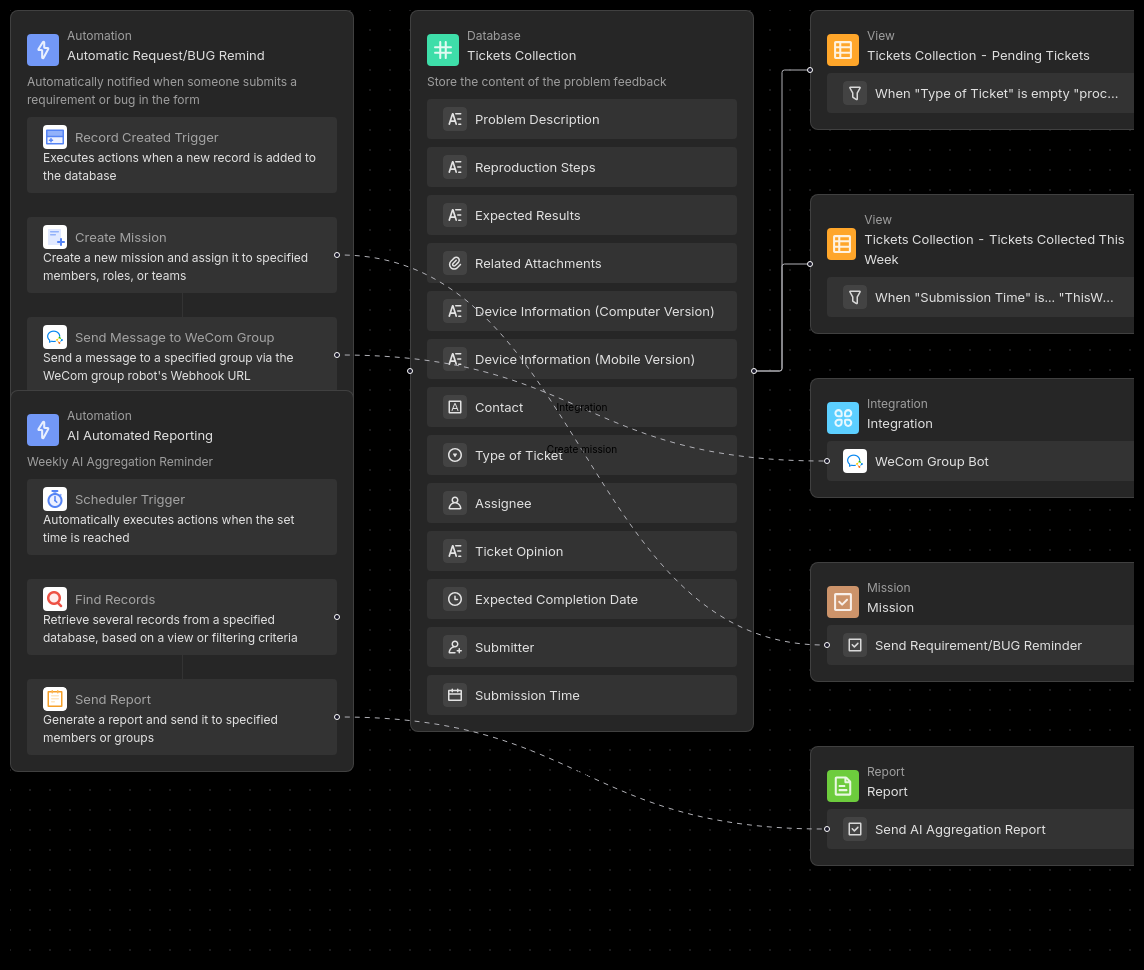
How to Use Bika.ai's Template for QA Engineers
To manage project issues, tickets, requirements, and bugs using Bika.ai's template, QA Engineers can follow these steps:
- Install the template into your Bika Space Station. If multiple projects need to be managed simultaneously, the template can be installed multiple times, with one template corresponding to one project.
- Enter new feedback through the form. The template provides a database and a form. Data submitted in the form is automatically recorded in the database, which includes detailed fields for comprehensive issue tracking.
- Configure the automation tasks. Enter the edit interface of the automation tasks to modify trigger conditions and execution actions. Options for sending user feedback messages directly to WeCom are also available.
- Test the automation tasks to ensure the successful sending of reminder notifications and reports.
- Start the automation tasks to enjoy the seamless management of project issues and tickets.
Switching from Airtable to Bika.ai
Switching from Airtable to Bika.ai is a straightforward process:
- Export your data from Airtable in a CSV or Excel format.
- Sign up for Bika.ai and use its data import tools to transfer your data.
- Set up your automation templates in Bika.ai and immediately start experiencing the benefits of AI automation.
It's time for QA Engineers to embrace the power of Bika.ai and revolutionize their project management processes.

Recommend Reading
- Airtable Alternative for Marketing Teams: WeCom Scheduled Notifications
- Vika OKR: Airtable Alternative to task assignment and follow-up
- Data Automation with Bika.ai: Unlocking New Potential for B2B AI CRM in analyze market demand
- Data Automation with Bika.ai: Unlocking New Potential for Slack Channel Scheduled Notifications in Daily standup reminders
- AI Data Automation with Bika.ai: Unlocking New Potential for Auto Follow-Up Email for New Leads in Provide sales reports
Recommend AI Automation Templates
